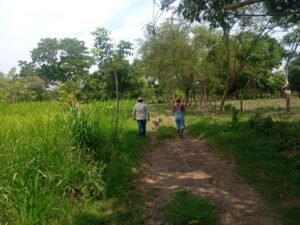1. Business Description
Lola's Farm is a farm that has successfully diversified products derived from small animals and cattle, taking advantage of the milk, eggs, and honey from bees. They used to have conventional and industrial milk production, but the crisis in their production made them change their way of thinking about the resources they had. The use of the land was much more extensive, with fewer cattle per unit of area. Currently they manage the same number of cattle in half the area. Currently, the cattle are fed with natural grass and fodder in a PRV (Voisin Rational Grazing) and SSP (Silvopastoral System) system. The area that was no longer used for livestock farming was largely used for restoration. The sale is direct, without intermediaries, and very close to where the consumers live, who are a small niche that seeks more natural and healthy products regardless of their higher cost. The farm has managed to significantly reduce its costs thanks to the reduction in the use of external inputs while improving its own forage banks and pastures, and implementing the holistic system in livestock. Likewise, the fact of generating through closed farming has allowed them to avoid diseases that can also represent high costs. The company has highly trained and professional people, and has a processing plant with good equipment for processing milk and making different types of cheese.

The farm has only managed to break even financially after 8 years of operation, given that labor represents high costs, as well as inputs, especially the concentrate. Another very important expense is the health records that have to be updated periodically and given the high number of products they have due to the diversity of cheeses, each product represents an additional cost in records. Its market is mainly in the upper and upper middle class of the capital, and its largest point of sale is the Mercadito de Lola, which operates in an exclusive area of the city, in a house that also belongs to the family and is run by a relative.
2. Productive system
Lola's Farm is a family business dedicated to the production and processing of dairy products, eggs and chicken meat, honey, as well as the sale of live chickens. The farm uses a holistic livestock system promoted by Allan Savory, where animals are concentrated in very small areas so that they trample and fertilize through excrement for one day, and are rotated for 60 days to return to the initial pasture.

The dairy uses a mobile electric fence to move the cattle to each of the paddocks, which have an area of 1500 m2. No chemicals or artificial fertilization are used in the paddocks, and no other types of plants that may grow next to the grass are removed. Leucaena trees and shade trees are incorporated into the paddocks, especially on the borders. The dairy is mechanized and produces a daily volume of 150 L. The milk is sold, but different cow and goat cheeses are also produced. The dairy system is a system of dairy farming, which is used to produce milk and milk from goats.
bras is not considered regenerative, but rather conventional, although it also does not contain chemicals and the animals are fed with forage that is planted on the farm, such as nacedero and buttercup (titonia).
The chicken system takes place in very large, shaded chicken coops. They are fed with concentrates and fodder. Hormones and chemicals are not used for the chickens. As for the beekeeping system, it is carried out using traditional hives, the Langstroth system, and its extraction is done by hand using a manual centrifuge. On the farm, various types of fodder, grass, corn and sorghum are also planted (the latter two, under a conventional system in monocultures using chemicals and artificial fertilization together with natural fertilizer). The grey water and waste water from dairy and cheese production are returned to the pastures and those that require treatment go through biofilter systems.
The farm has a processing plant with modern machinery and two employees where they pasteurize the milk and produce various types of fresh and mature cheeses. They still have the opportunity to focus on the most profitable products, and at the same time seek greater diversification to explore profitable alternatives. In addition, with the holistic livestock system they can become a model farm.
3. Main limitations
The following challenges were identified. First, the demand for eggs is greater than their production capacity. Second, the paperwork at the Ministry of Health is still very expensive. Third, the niche for selling cheese and other products is quite small, in addition to the lack of a culture of consumption of this type of product in the country. And fourth, there is a lot of unfair competition that does not have health records and does not use whole milk in the production of artisanal cheeses. The farm also considers that the policies surrounding the food system in Guatemala are a limitation for this type of development.
4. Moving towards a regenerative approach











